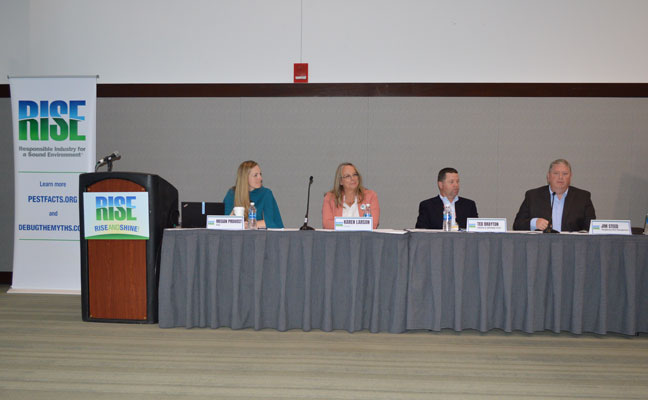
Speakers at the RISE Industry Issues Breakfast held at PestWorld 2022 included, from left, Megan Provost, RISE; Karen Larson, Clarke Mosquito Control, St. Charles, Ill.; Ted Brayton, Griggs and Browne Co., Cranston, R.I.; and Jim Steed, Neighborly Pest Management, Roseville, Calif. PHOTO: PMP STAFF
The Pesticide Registration Improvement Act (PRIA) authorizes a fee-for-service program for pesticide registration and review activities within the U.S. Environmental Protection Agency’s (EPA’s) Office of Pesticide Programs (OPP). PRIA is coming up for reauthorization for the fourth time since originally passing into law in 2004. Along with other national pesticide registrant associations, we’re working on passing PRIA 5 during 2022 in the 117th Congress. To achieve this goal, we are seeking broad support from pesticide applicator’s associations, including the National Pest Management Association (NPMA).
You may find it unusual for pesticide manufacturers to advocate for additional resources for EPA and to seek broad support for PRIA from external stakeholders and across party lines in Congress, but that is what we are doing as an industry. PRIA 5 is both unusual and important, because the fees paid by pesticide manufacturers under this program support business predictability within the EPA’s pesticide registration process, providing established timelines for bringing new products and new product uses to the market. Predictability supports innovation, and the fees our members pay ensure the OPP has the resources it needs to complete its assessments on a set schedule. This predictability helps our members deliver new tools and technology to pest management professionals (PMPs) so they can continue to make people’s lives better.
NETWORKING OPPORTUNITIES

Megan Provost is president of Responsible Industry for a Sound Environment (RISE). She may be reached at 202-872-3860 or RISE@pestfacts.org.
We’re also looking forward to the 2023 legislative session and thinking about outreach to new and tenured elected officials and appointees. We had the opportunity to talk about the importance of storytelling and proactive outreach to policymakers at all levels of government during our RISE Industry Issues Breakfast last month during PestWorld. PMPs and industry leaders Ted Brayton, of Cranston, R.I.-based Griggs and Browne Co., and Jim Steed, of Roseville, Calif.-based Neighborly Pest Management, shared their personal experiences talking about benefits and advocating for appropriate and balanced public policy to support the good work PMPs are doing — and will need to do in the future, as pest pressure and society’s expectations about health and safety evolve.
Supporting appropriate funding for the OPP is one way we ensure innovative products and new product uses get to the pest management marketplace in a predictable and timely way. Taking up the grassroots call to action and proactivity, especially with new legislators elected this November, is another way to ensure the pesticide technology PMPs need is available for current and emerging threats to public health, safety and infrastructure.
LOOKING AHEAD
As 2022 wraps up, we are planning for a new wave of national public opinion research that we look forward to sharing with PMPs early in the new year. In the meantime, our 2022 research gives us good reason to plan for and seek out conversations about pesticides to promote greater understanding and to support sound public policy.
I’ll leave you with four of these highlights (and conversation starters):
- Most Americans use pesticides. Fifty-eight percent of respondents have personally used, or paid someone to use pesticide products around their home this year.
- Approximately 76 percent of respondents agree pesticides are necessary to protect families from health problems and discomfort caused by bugs and weeds.
- Learning about the pesticide regulatory framework at the federal and state levels increases people’s perceptions of product safety, with 78 percent of respondents in agreement.
- Last, but not least, 62 percent of Americans agree their local government should not implement pesticide regulations that override federal or state regulatory authority.
Leave A Comment